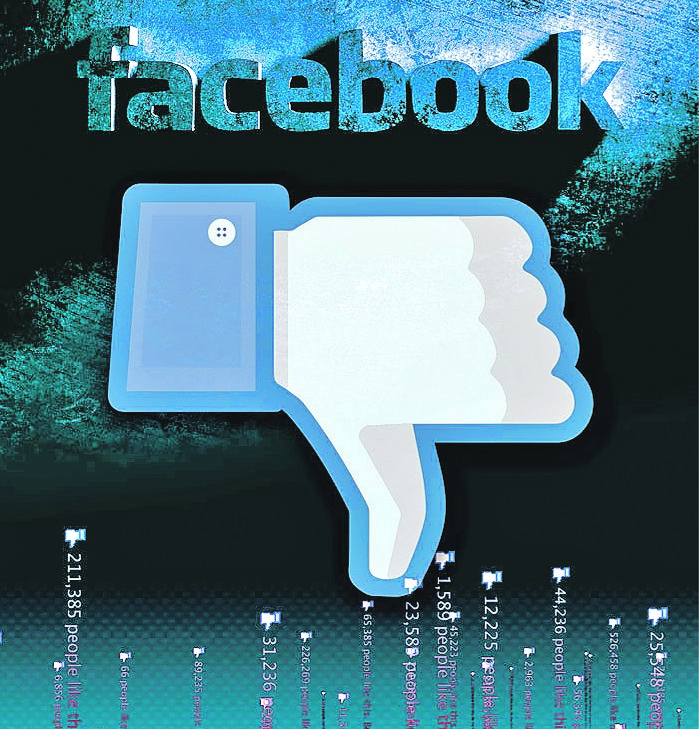
Hi, my name is Lloyd and I am a Facebook addict.
I have been clean for four months now.
I didn’t really have a problem, but hearing myself say those words triggers the cynic in me.
My decision to quit Facebook built up over a number of years until I had no other choice.
I got my first taste of freedom a few years ago when I unplugged for the December holidays. I abandoned Facebook, Twitter and Gmail, stopped reading newspapers, left my phone in my bedroom and only checked it every few days. I was burnt out and needed some time to think.
I devoured books, went for long walks on the beach with my dogs and cooked good food.
When I returned to Johannesburg, I was ready for the working year. I had made a promise to myself, which I subsequently broke, to be offline more often.
Back in the swing of things, I was lured into the world of Facebook, became all too familiar again with the noise. The outrage machine became like a drone in the back of my mind.
The acts of public shaming, the games of one-upmanship, the verbose displays of lifestyle, the stylised construction of image and identity, the online you versus the real you...
I witnessed friends being censored because of white tears and patriarchy. God forbid you post a picture that has a nipple on display or try to have difficult conversations about racism, sexism, homophobia, white privilege or transformation.
Someone is bound to get upset and run off to the Facebook police.
With Facebook, it’s all about the trade-offs. What you willingly receive versus what you allow into your life.
As Saul Williams spits on his 2016 album MartyrLoserKing: “People who choose to share/ People who share too much/ People who seem lonely/ People who want to connect/ People who want to uplift/ People who need uplifting.”
A recent study at Cornell University in the US found that people who battled to quit Facebook were more likely using the platform to manage how people perceived them and considered Facebook an addiction.
If you read all the online column inches dedicated to Facebook psychology, you will see the word ‘addiction’ everywhere.
Time magazine wrote a 2014 cover feature showing how academics, business leaders and governments are realising the importance of creating quiet times for reflection; for being in the moment, without distraction.
Facebook is the definition of distraction.
It offers us the “hit” – we get to scratch the surface of deep feelings without ever diving in head-on. It allows us to connect, but in a shallow, transient way.
It doesn’t make us think.
It’s like the endless hours I have spent watching cop shows, where crimes are committed and solved in 45 minutes. Am I really engaged, or am I just staring at something happening in the background?
...
By last December, I was ready for another detox. But this time I was really thinking I needed to quit this thing for good.
Around this time, I was reading an old interview with experimental hip-hop crew Death Grips. Asked about the group deleting its Twitter account, the band’s Zach Hill said: “What are you even doing on there? You’re just shouting into this thing. It’s just nothing, really. A lot of great ideas get wasted on it. I see tweets and think, ‘Man, you should have saved that and done something with it’. The whole thing feels cheap to us. It’s a little bit desperate. We’re into creativity, not talking about it all day.”
I began to wonder how Facebook was affecting my work, my creativity.
Is Google Making Us Stupid? asked Nicholas Carr in a 2008 piece for the Atlantic: “Facebook is to the mind what sugar is to the body. Facebook ... is easy to digest. It has made it easy to consume small bites of trivial matter, titbits that don’t really concern our lives and don’t require thinking. That’s why we experience almost no saturation. Unlike reading books and long magazine articles (that require thinking), we can swallow limitless quantities of photos and status updates ... Sadly, we are still far from beginning to recognise how toxic Facebook can be.”
Carr argued that to filter out the noise, users needed to develop “a new self-awareness so that we know when we’re being sucked in, when we’re wasting time, when we’re being spun an algorithmic line”.
Facebook’s algorithm uses all the bits of data that it has garnered about you to create a profile of you to decide what you want to see in your feed.
Carr felt he was losing the “creativity and original thought” that happens randomly in exciting bursts of ideas when you least expect them.
My detox Decembers proved his point. I needed more quiet time.
Because it’s in the quiet spaces that can be found in reading a book or thinking contemplatively that we process the world around us, draw our own conclusions, foster our own ideas.
There are 14 million monthly active users of Facebook in SA
90% are on cellphones
More than 50% are daily active users
If we fill up the quiet spaces with inane content, we sacrifice these very important human functions.
...
I had to start asking myself hard questions about what exactly I was getting from Facebook and what it was taking from me.
So why was I on Facebook for 10 years?
The first reason I survived that long was because I used a pseudonym. I didn’t want a whole bunch of people from my past contacting me.
Secondly, at least half my weekly job used to be writing about music and Facebook allowed me be to be in touch with musicians. I knew when they were in studio, when they were playing live, when they had a new album or video out. They were easily contactable and a number of interviews I did were via Facebook’s messaging service.
I got sucked into the social world of Facebook, commenting on posts, getting into debates, sharing pictures of myself and my friends with zero concern for privacy, kidding myself that I was more in touch.
As if liking a picture of your friend is a substitute for a phone call or an email.
But what really started to get to me was the vile behaviour so many people exhibit on Facebook.
I’m not only talking about the droves of racism, sexism and homophobia, often essentially defended by Facebook’s position within the white, patriarchal, hetero-normative hegemony.
Prejudice and bigotry exist in the real world, so it wasn’t the opinions that shocked me, it was the tone.
As a journalist with a big mouth, I was attacked many times for things I had written and shared. I was called “idiot”, “asshole”, “fat”, that I “wanted to be black”, that I was “racist”, against my own race, nogal.
There were white conservatives who didn’t like what I had to say about transformation and sport. Mediocre musicians who were outraged that I deemed their album not worth writing about. Trolls who didn’t share politics.
As a human with a well-defined sense of self, these insults were like water off a duck’s back, but I started to think about what this kind of online abuse does to less thick-skinned individuals.
Why did people on Facebook feel they could say these hurtful things to a complete stranger?
Facebook began to look like a deformed, mutated version of the real world, where our vilest selves rose to the surface.
Sure, it wasn’t all bad.
I had some great friends on Facebook, but most of them were my great friends in real life, too.
I began to feel uncomfortable welcoming all this negativity into my life.
Was I exposing myself to all this noise, just because I was too lazy to do what my job required with the use of a cellphone and an email account? I began to question how much real value I was getting from Facebook.
Questions like these are the last thing that companies who benefit from your likes, clicks, views or reads want you to ask.
The quicker we browse the web, the more we click, watch, produce and share, the more opportunity there is for money to be made and private information to be collected.
...
Journalism now thrives on short, sharp, punchy pieces; often giving a take or spin on a story, rather than nitty-gritty in-depth reporting.
Basically journalism chose to fit in with Facebook, rather than Facebook fitting around it.
In-depth reporting takes time and costs money, and in a world where commerce is tied to the number of clicks a story receives, it tends to be sacrificed for sensationalism.
And the rush to be first can lead to sloppy journalism, as former Mail & Guardian editor Chris Roper pointed out in a 2013 piece, Pistorius ‘Spike’ Breaks Journalism!
We, wrote Roper, are a “tabloid nation”.
“Today’s reader has become a user – not just in the way people manipulate, contribute to and create all sorts of content, but also in the way they have become addicted to the rush of consuming and disseminating constant data.
“This used to be the preserve of tabloid journalism: the quick sugary hit, the constant craving and the inevitable entropy of disposable data,” he wrote.
Notice the language of addiction.
Driving the public obsession with Oscar Pistorius is the outrage machine; this is what many people are addicted to on social media.
The Judge Mabel Jansen scandal, the Penny Sparrow case.
If the outrage gets loud enough, the mainstream media begins to pay attention.
When the story is exposed to a much wider audience, an additional social media reaction takes place.
At this point, journalists are reporting the social media reaction and a number of think pieces will probably be penned. The lists of contextualising events will pop up.
There may be defiance from the subject of the outrage or an apology, both will further fuel the outrage machine and allow the media to turn a scandal into an event that keeps on giving. That is until the target rests on the next object of outrage.
Social media doesn’t just distribute news, it makes news now.
But the distribution issue is also one to ponder.
A lot of thought and research have gone into Facebook’s algorithms and how they create echo chambers, where the majority of information that you are fed reinforces your world-view, rather than challenges it. We only see what we want to see.
Two weeks ago, Facebook tweaked its algorithms again.
“We are updating News Feed over the coming weeks so that the things posted by the friends you care about are higher up,” Facebook’s Lars Backstrom wrote.
Sounds like the echo chamber just got a lot louder, but, being clean, I can’t speak from first-hand experience.




 Publications
Publications
 Partners
Partners








